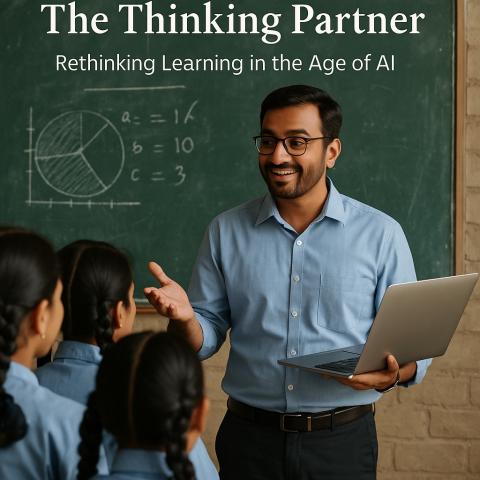
The Thinking Partner: Rethinking Learning in the Age of AI
When it was 10 minutes to complete my class, one of my colleagues entered my class. He wanted to give instructions regarding the assignment which trainees need to prepare and submit. “Don’t use AI for preparing your assignment,” he categorically mentioned. I was sitting right beside him. Suddenly, all students stared at me. I was silent.
In the same class, for the last 50 minutes, I was speaking on how to use AI as your thinking partner. I began the class with the question of apprehension that is often asked: If you use it, you lose your capacity to think. Many of us, while growing up, heard similar arguments about mathematics. I think, still, in Indian classrooms, calculators are not allowed in mathematics classes. What’s the argument? Children will lose the capacity to calculate mentally! We still remember the table of 17, but these kids can’t. This sounds quite logical. Yet, despite our insistence on mental calculation, we hardly produced mathematicians of global fame. True mathematical thinking didn’t flourish through memorizing tables, but through imagination and abstraction — something our system rarely nurtured.
But when we look at applied mathematics and its role in technological innovation, we are far behind the developed countries of the global North. Without calculators in the classroom, we could do some calculations efficiently or mentally, but when it comes to big calculations, we fail. And the ability to calculate is not equal to thinking. Rather, by focusing on mental calculation, we significantly channelize our cognitive capacity on calculation and miss out on mathematical thinking.
Well, this was just an example, but it got a little far-fetched. I remember similar arguments some people made when printed materials democratized ideas. The apprehension was—it will spoil our thinking! Today we know, it revolutionized the world.
There has been a series of inventions that fundamentally changed the way humans live. We often refer to it as a paradigm shift. The AI revolution appears to be one of that kind; it will shift the paradigm. Soon, we will see its mediating role in almost every aspect of human life. And therefore, we need to face it and learn to navigate it. The sea is quite powerful, but some learn to surf on its waves. AI appears to be hegemonic, leaving little choice, as Shoshana Zuboff has articulated in her classic book The Age of Surveillance Capitalism. But do we have a choice? The only way is to embrace it—deploy it to do what we have not been able to do without it. Its promise in education and medicine is quite significant. People are sharing several use cases of how they are harnessing the AI revolution, and the homework for my students was also to think of their own pathways of using AI as a thinking partner. I also shared an example of how I utilize it as a thinking partner, one can read it here: Learning with AI: A Journey Fueled by Curiosity and Questions.
The concern will remain, and we should not brush it aside. I see the value in the instruction—don’t use AI for this task. But we have to engage with these concerns. There have to be a few guiding questions that may help us in the evaluation: Where does it take humanity? Would it help make society more equitable? Would it take care of issues of injustice and inequality? Or would it just be another productivity hack? Will it help humans expand their thinking in different disciplines of human pursuit? And so on. Answers to these questions may help us decide how we integrate it into our lives.
Yet beyond these questions lies a deeper invitation—to rethink what it means to be human in times of accelerating intelligence. The challenge is not whether we use AI or not, but whether we use it thoughtfully. Each generation has faced its own version of this dilemma, and ours happens to arrive with algorithms. My students looked at me that day for an answer; perhaps the real lesson was that there isn’t one. There is only a direction—to stay curious, to stay critical, and to ensure that even in an age of artificial intelligence, our capacity for wonder and reflection remains profoundly human.
- Log in to post comments
